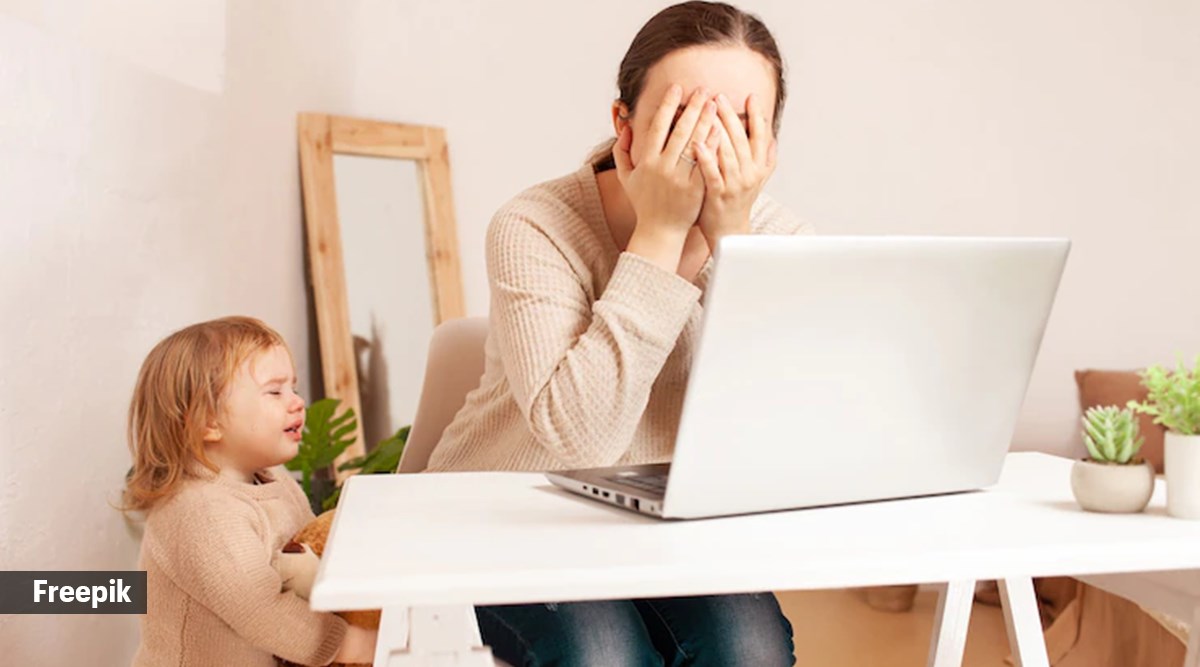If you feel fatigue, frustration, or detachment as a parent, you may be struggling with parental burnout
"Since parenting is a lifetime commitment, resigning is not an option. This is why it is so important to recognise the signs of any impending parental burnout and begin to put strategies in place to deal with it before total burnout happens," said Anna Hema Sam, Clinical Psychologist, Even Healthcare
 It is important to recognise the signs of any impending parental burnout and begin to put strategies in place to deal with it before total burnout happens. (Source: Freepik)
It is important to recognise the signs of any impending parental burnout and begin to put strategies in place to deal with it before total burnout happens. (Source: Freepik) A few hours after her daughter was born, Sukanya Roy experienced a panic attack. The reason: the hospital she gave birth at had limited facilities and did not allow any family members to be present either — a situation that led to Roy being without any support for hours after delivery. This feeling got triggered once again when she resumed work but was unable to balance parental and work duties. “The organisation had no mechanism for me to do my job and take care of my newborn child at the same time, which led to further stress,” she said, adding that she had to ultimately quit her job to take care of her child.
But, luckily for Roy, there was a silver lining — a support group of mothers on WhatsApp who were facing similar difficulties. “The group, along with counselling, enabled me to find solutions and deal with the burnout,” she said.
Bhawana Narula, who experienced parental burnout in phases, had a similar story to share. “As a first-time mother, there were too many expectations of me. This pushed me over the edge. My entire life started revolving around my daughter,” she said, explaining that it only escalated when she joined back work after her maternity break.
But it’s not just women. Vinit Kumar, too, first experienced parental burnout when his wife resumed work from office after maternity leave, while he continued to work from home. “Without the support of any family member, I had to take care of our baby while balancing my work duties. So, initially, I was unable to do justice to my work and was reprimanded by the HR manager of my company,” he said, adding that he started working late in the evening when his baby was asleep to complete his tasks, but this hampered his sleep and increased his stress levels.
What is parental burnout?
Explaining the phenomena, Anna Hema Sam, Clinical Psychologist, Even Healthcare told indianexpress.com, “According to a 2020 research review, parental burnout is a chronic condition resulting from high levels of parenting-related stress due to a mismatch between the demands of parenting and the resources available for them to meet those demands.”
She added that burnout is a gradual progression in which many parents don’t start to realise they are at risk until it starts to take a hold of them. “Since parenting is a lifetime commitment, resigning is not an option. This is why it is so important to recognise the signs of any impending parental burnout and begin to put strategies in place to deal with it before total burnout happens,” Sam said.
Pandemic-fuelled parental burnout
 Burnout is a gradual progression in which many parents don’t start to realise that they are risk until it starts to take a hold of them. (Source: Freepik)
Burnout is a gradual progression in which many parents don’t start to realise that they are risk until it starts to take a hold of them. (Source: Freepik)
Over the past few years, owing to the Covid-19 pandemic, instances of parental burnout have only seemed to have increased. According to a study titled “Examining the Epidemic of Working Parental Burnout and Strategies to Help” published in May 2022, 66 per cent of working parents during the pandemic met the criteria for parental burnout.
Highlighting the same, Vishnu Priya Bhagirath, a counselling psychologist said, “Parental burnout is characterised by feelings of fatigue, frustration and detachment from one’s role as a parent. This has escalated due to the pandemic as new challenges have emerged for parents in terms of managing virtual learning, financial strain and increased childcare responsibilities.”
According to Divya Sharma, Chief Learning Officer and Psychologist at MyPeegu, certain factors may increase risk of experiencing parental burnout; these include single parenting, high-demand children who require extra attention or have developmental issues, lack of social support, work-life balance and personal history of mental health problems or trauma.
But parental burnout not only affects parents, it affects kids too. “It is an interlinked eco-system,” said Aruna Agarwal, Founder of Kidzee and Mount Litera Zee School, and a child psychologist, stressing on the fact that when parents are burnt out, kids may end up feeling neglected and can take the wrong steps. They may start skipping their studies and get addicted to longer screen time, and in the internet age, they may even make the wrong friends or face unforeseen situations, they otherwise would not.
Agreed Dr Paramita Mishra, Principal, Orchids International School, Bangalore, and shared that she experienced a “lot of tantrums from my daughter who would refuse to eat food, did not complete school assignments and would befriend people I was opposed to.” But, reprimanding her child made her feel like a “villain”, which is when she realised the need to strike the right balance of “empathy, sacrifice and compassion.”
Similarly, what helped Narula was inculcating essential habits in her child such as brushing teeth, organising toys, and doing homework all by herself. “It was difficult initially, but it really helped ease unnecessary pressure and also reduced excessive intervention,” she said.
Here are some tips to manage parental burnout, as per experts:
*Setting realistic expectations and boundaries with your children and partner
*Learn to say no and not feel embarrassed about it.
*Practice self-care through activities such as meditation, reading or spending time friends
*Seek support from friends, family members, or mental health professionals
*Take a break
📣 For more lifestyle news, follow us on Instagram | Twitter | Facebook and don’t miss out on the latest updates!
- 01
- 02
- 03
- 04
- 05































